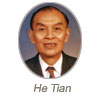AWARDEE OF TECHNOLOGICAL SCIENCES PRIZE
MAO BINGQUAN
Professor Mao Bingquan, Polymer Engineering Specialist, born in Guangzhou, GuangdongProvince, China, in Nov. 1933. Master of Engineering, Mendeleev Institute of Chemical Technology, Moscow, USSR, 1959. Teacher at Chengdu Institute of Technology from 1959 to 1971. Researcher at Beijing Research Institute of Chemical Industry from 1972. Currently vice chairman, Science and Technology Committee of the institute, professor, supervisor of doctorate candidates. He was elected the academician of the Chinese Academy of Engineering in 1995.
Prof. Maos contribution to the field he has been persevering in creative work in olefin polymerization catalyst and process, polymerization mechanism, polyolefin structure and performance.
Widely used in batch bulk polymerization units in China, the ComplexⅡpropylene polymerization catalyst with high activity and high stereospecificity developed by his research group was awarded with the Third Prize of National Invention in 1982. His research work of Thousand Ton Scale Propylene Polymerization Technology with Refinery Gas as Raw Material was awarded with the First Prize of SINOPEC Science and Technology Progress, and finally turned into hundreds of batch bulk PP units of small or medium size in China.
Research of his group in new generation high efficiency polyolefin catalyst led to patents of catalyst system for olefin polymerization and copolymerizationin China, US, Japan and Europe. The patent was licensed to Phillips Petroleum with 18 million US dollars in 1988. The catalyst with brand names of N and Lynx has a considerable market share in various PP processes. The patent was awarded with the Second Price of National Invention in 1993.
DQ spherical catalyst for propylene polymerization developed by his group was patented in 1997, commercialized in 1999, and exported to use in PP facilities in Southeast Asia and Middle East. The patent was awarded with the Second Prize of National Invention in 2003.
Prof. Mao also won 11 other prizes for his work, published over 30 papers both home and abroad, and educated over 10 master and doctorate students.






